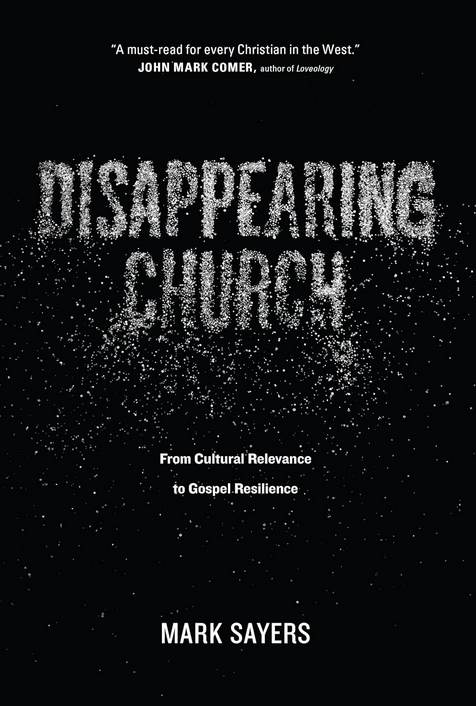I read a lot, and there’s so much great stuff out there to read that I’ve started a series of blog posts sharing my top 5-10 highlights from my current reading. These highlights will help you get a sense of the contents of a book and discern whether or not it’s something you should prioritize reading.

Summary:
A sharply insightful analysis and critique of ways that the church in the modern west has been “colonized” by significantly un-Christian thinking, this book is a must-read for any pastor or ministry leader. Part 1 is particularly insightful, and part 2 provides some practical responses to the “disappearance” of the church.
Highlights from the book:
What we are experiencing is not the eradication of God from the Western mind, but rather the enthroning of the self as the greatest authority. God is increasingly relegated to the role of servant, and massager of the personal will. We will find that progressive, contemporary Western culture is shaped by an ancient heresy—Gnosticism. Gnosticism at its heart is an alternate gospel, which moves authority from God to the self, in which the individual seeks to power their own development and salvation.
Post-Christianity is not pre-Christianity; rather post-Christianity attempts to move beyond Christianity, whilst simultaneously feasting upon its fruit. Post-Christian culture attempts to retain the solace of faith, whilst gutting it of the costs, commitments, and restraints that the gospel places upon the individual will. Post-Christianity intuitively yearns for the justice and shalom of the kingdom, whilst defending the reign of the individual will. Post-Christianity is Christianity emptied of its content, as theologian Henri de Lubac would warn: Forms of atheistic humanism often preserved a number of values that were Christian in origin; but having cut off these values from their source, they were powerless to maintain them in their full strength or even in their authentic integrity.
So distracted by the phony war between left and right, conservatives and liberals, we have failed to notice that a new power had seized control of both our imaginations and the halls of power. This new power swirls around a small yet widely held set of beliefs:
1. The highest good is individual freedom, happiness, self-definition, and self-expression.
2. Traditions, religions, received wisdom, regulations, and social ties that restrict individual freedom, happiness, self-definition, and self-expression must be reshaped, deconstructed, or destroyed.
3. The world will inevitably improve as the scope of individual freedom grows. Technology—in particular the Internet—will motor this progression toward utopia.
4. The primary social ethic is tolerance of everyone’s self-defined quest for individual freedom and self-expression. Any deviation from this ethic of tolerance is dangerous and must not be tolerated. Therefore social justice is less about economic or class inequality, and more about issues of equality relating to individual identity, self-expression, and personal autonomy.
5. Humans are inherently good.
6. Large-scale structures and institutions are suspicious at best and evil at worst.
7. Forms of external authority are rejected and personal authenticity is lauded.
Following liberal Christianity’s lead, the majority of Westerners hold to a belief in a pleasant afterlife and a benevolent Christian-esque God. However, the doctrines of divine judgment and hell are ditched as repugnantly retrograde. Concepts of personal morality and the pursuit of virtue are replaced by a desire for the communal good. The dogma of the kingdom of God and the coming New Jerusalem exists, but is reframed as the pursuit and possibility of a perfected, inclusive, civil society. Satan and the possibility of personal evil and sin remerges in a new depersonalized form, as Bottum explains: “Sin, in other words, appears as a social fact and the redeemed personality becomes confident about its own salvation by being aware of that fact. By knowing about, and rejecting, the evil that darkens society.”
The post-Christian robbed of God as a moral standard must “virtue signal” instead to prove their goodness to others, surrounding themselves with others who will mirror back and affirm their goodness, while casting pharisaical accusations and curses of outrage down upon those who do not hold the correct moral line. In reframing Christianity, the post-Christian births a reframed puritanical approach to morality. While our post-Christian age has divested itself of attaching any morality to sexuality (barring rape and the abuse of minors), it approaches health, food, and the body with a puritanical fervor.
The post-Christian revolution is a kind of Christian revolution minus Christ, in which the enemy is always the other, in which justice is always sought externally. The Christian revolution demanded the death of the king, but not the king that sat in a palace; rather it demanded the death of the kings and queens who ate of the fruit in the garden. However, at the height of the revolution the only good King, the only monarch who ruled with justice and righteousness, who did not deserve to be toppled, allowed Himself to be executed, so that we with all our pretenses of royalty would not have to die for our unjust rule. The cross held both love and justice together. The gift of grace caused humans to fall at the foot of the cross, understanding that they were sinful, only then to be picked up into the loving arms of Christ to find that they were children of God. The exclusivity of the cross was the doorway to the inclusivity of the kingdom.
in the West, a unique kind of culture has emerged, one that promotes elements of the universal Christian vision of justice while deconstructing the Christian tradition and any convention that attempts to limit individual freedom and autonomy.
The danger for Christian second cultures communicating the gospel to pre-Christian cultures is that they may inadvertently colonize them. The danger when Christian second cultures communicate the gospel to post-Christian third cultures is that they themselves may be colonized—for the third culture is just as evangelistic as the second culture. With its great mission to prohibit anyone from prohibiting, it seeks to propagate its dogma that there should be no dogma.
To be shaped by grace in a culture of self, the most countercultural act one can commit in the third culture is to break its only taboo: to commit self-disobedience. To acknowledge that authority does not lie with us, that we ultimately have no autonomy. To admit that we are broken, that we are rebellious against God and His rule. To admit that Christ is ruler. To abandon our rule and to collapse into His arms of grace. To dig deep roots into His love.
our heresy hidden under the surface is our belief that God would not ask Western people to deny themselves. Our alternative gospel is that we are Gnostic Christian seekers, searching for the good life, wanting the solace of faith with the autonomy of the third culture. The radical descriptor that Scripture uses to describe the followers of Jesus is not seekers, but slaves. In 2 Corinthians 2:14 (ESV), Paul writes, “Thanks be to God, who in Christ always leads us in triumphal procession and through us spreads the fragrance of the knowledge of him everywhere.” In 1 Corinthians 4:9 (NIV) Paul again uses this imagery to describe Christian discipleship, writing, “God has put us apostles on display at the end of the procession, like those condemned to die in the arena. We have been made a spectacle to the whole universe, to angels as well as to human beings.”
Only the cross can hold together both the world and heaven. Only the cross can rejoin our public and private worlds. It shows us the way to properly live in and enjoy creation. We are not to escape, and we are not to possess; we are to sacrifice. The slaves of Christ understand that the world is God’s. It is not to be possessed, rather it points back to Him.




No Comments